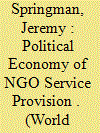|
|
|
Sort Order |
|
|
|
Items / Page
|
|
|
|
|
|
|
| Srl | Item |
| 1 |
ID:
188690


|
|
|
|
|
| Summary/Abstract |
Oil and gas discoveries in developing countries are often associated with shortsighted economic policies and, in response, with calls to insulate resource management from populist impulses. The authors report on a randomized experiment that tested methods to overcome this apparent tension between sound resource governance and democratic politics. Soon after Tanzania's discovery of major natural gas reserves, the authors invited a nationally representative sample of voters to take part in an intensive public deliberation of policy options, at an event featuring nationally recognized experts and small-group discussions. Democratic deliberation reinforced the public's strong preference for rapid spending of gas revenues, but also increased support for various prudential and economically orthodox measures, such as the independent oversight of gas revenues, limits on government borrowing, and selling gas abroad rather than subsidizing fuel at home. These effects were driven by deliberation per se, rather than a pure information treatment, and show no evidence of contamination by facilitator effects or peer effects in group deliberations.
|
|
|
|
|
|
|
|
|
|
|
|
|
|
|
|
| 2 |
ID:
188691


|
|
|
|
|
| Summary/Abstract |
Coethnics often work in the same industries. How does this ethnic clustering affect individuals’ political loyalties amid industrial growth and decline? Focusing on migrant groups, the author contends that ethnic groups’ distribution across industries alters the political allegiances of their members. When a group is concentrated in a growing industry, economic optimism and resources flow between coethnics, bolstering migrants’ confidence in their economic security and dissuading investments in local political incorporation. When a group is concentrated in a declining industry, these gains dissipate, leading migrants to integrate into out-groups with greater access to political rents. Analyses of immigrants near US coal mines in the early twentieth century support this theory. The article shows how ethnic groups’ distribution across industries shapes the evolution of group cleavages and illuminates how decarbonizing transitions away from fossil fuels may reshape identity conflicts.
|
|
|
|
|
|
|
|
|
|
|
|
|
|
|
|
| 3 |
ID:
188688


|
|
|
|
|
| Summary/Abstract |
Authoritarian regimes repress to prevent mass resistance to their rule. In doing so, regimes’ security forces require information about the dissidents who mobilize such resistance. Political competition, which fuels partisan rivalries, offers one solution to this problem by motivating civilians to provide needed information to security forces. Yet civilians share information about any political opponents, not just dissidents, which creates a challenge for regimes that want to target dissidents. Drawing on novel archival data from the immediate aftermath of the 1973 coup that brought Augusto Pinochet to power in Chile, a period that included civilian collaboration with repression, this article presents evidence that close pre-coup political competition is associated with more frequent repression and more targeting of non-dissidents. The author uses pre-coup democratic elections to measure political competition and addresses the challenge of estimating political preferences unaffected by repression. Qualitative evidence and further quantitative tests probe implications of the partisan rivalry mechanism and account for alternative explanations.
|
|
|
|
|
|
|
|
|
|
|
|
|
|
|
|
| 4 |
ID:
188689


|
|
|
|
|
| Summary/Abstract |
The share of basic services that NGOs deliver has grown dramatically in developing countries due to increased receipt of aid and philanthropy in these countries. Many scholars and practitioners worry that NGOs reduce reliance on government services and, in turn, lower demand for government provision and undermine political engagement. Others argue that NGOs prop-up poorly performing governments that receive undeserved credit for the production, allocation, or welfare effects of NGO services. Using original surveys and a randomized health intervention, implemented in parallel to a similar universal government program, this article investigates the long-term effect of NGO provision on political attitudes and behavior. Access to NGO services increased preferences for NGO, relative to government, provision. However, political engagement and perceptions of government legitimacy were unaffected. Instead, the intervention generated political credit for the incumbent president. This study finds that citizens see NGOs as a resource that powerful government actors control, and they reward actors who they see as responsible for allocation of those resources.
|
|
|
|
|
|
|
|
|
|
|
|
|
|
|
|
|
|
|
|
|